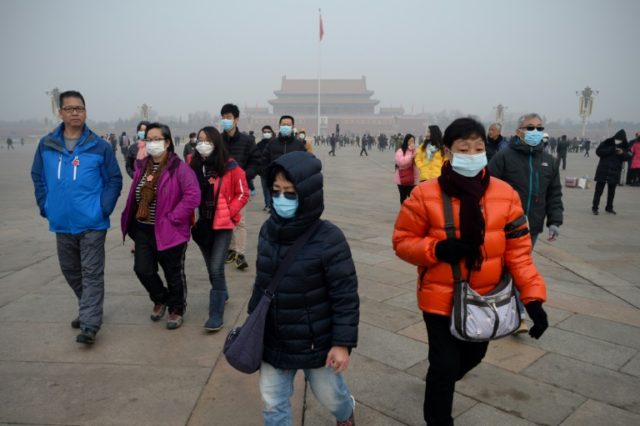China’s state-run Global Times attempted to sell the idea that the Chinese people universally agree with the Communist Party in all matters on Monday, arguing that the concept of human rights “has completely failed to appeal to Chinese people.”
The Global Times has increased the frequency of its columns claiming that Western notions of human rights and democratic governance are passé and inferior to the communist ideology that the Chinese government adheres to, which peaked in popularity internationally in the early 20th century. Global Times writers have also consistently argued that a united, “confident” China will soon eclipse a “chaotic,” “divided” West weakened by its adherence to human rights and democracy.
These claims downplay the widespread popularity of Christianity and Islam in China—both anathema to the Communist Party—and the growing strength of separatist, anti-Beijing movements in at least three parts of the country, four including Taiwan.
“The Western idea of human rights is now only connected with a very small number of dissidents and separatists in China, and has completely failed to appeal to Chinese people,” a column in the Times published Monday read. “The Chinese public has a stronger aversion than officials to Western preach about human rights in China.”
The article’s thesis is largely a rebuttal of concerns around the world that the Chinese Communist Party (CPC) is attempting to infiltrate Western institutions and popularize support for its totalitarian regime, and totalitarianism generally. Communist professors have attempted to establish CPC parties overseas, while Chinese students in countries like Australia have demanded professors censor themselves to conform to Chinese communist sensibilities. China has also internationalized classes on Marxist and Maoist indoctrination through the internet.
The Global Times not only denies that this is a problem, but claims that China’s only intent with these measures is “to foster a friendly attitude toward China in foreign countries.”
“Chinese people have never thought of stamping Chinese characteristics on Western social governance and ideology. Western criticism and sensationalization of China’s sharp power is probably caused by the West’s increasing loss of confidence,” the newspaper argues, going as far as to claim that even if Chinese officials wanted to impose their ideology on the world, “it’s beyond China’s capability, and doesn’t conform to the country’s diplomatic ideals, to influence the values of Western society by penetration.”
Instead, the piece claims, China is facing an onslaught of Western influence attempting to liberalize its society, a major concern for those in power.
Claims in this article that respect for human rights is widely unpopular in China contradicts prior Global Times editorials that argued, on the contrary, that China truly respects and adheres to human rights in a way the West does not.
“Common prosperity is the very definition of socialism with Chinese characteristics and perhaps the most fundamental human rights of all,” an article published in October claimed. “For most Chinese, human rights mean a roof over the head, literacy for all, food in the belly, expectation of reasonable health care in case of sickness, bright future for the children, and optimism for the old.”
As recently as last week, Communist Party leader Xi Jinping mentioned human rights favorably in a new directive to the party. “Judicial protection of human rights and property rights will be priorities” of the CPC, Xi declared in an announcement otherwise demanding absolute discipline in obeying him and the party.
This praise for human rights ends when it comes into conflict with the decades of abuses the CPC is responsible for against its people. Last summer, in response to the death of Nobel Peace Prize winner and longtime dissident Liu Xiaobo, the Global Times referred to human rights advocates as “losers” whose pursuit of justice will “only end in failure.”
Again in that article, the Times claimed, “Successive waves of dissidents that worship Western values have been marginalized, suggesting the West is losing the initiative in suppressing China’s rise.”
Dissidents have become an endemic “problem” for the Communist Party. It has almost completely lost control of independent Taiwan, which elected stridently anti-Beijing President Tsai Ing-wen in 2016. Hong Kong has organized widespread protests for years against attempts by Beijing to impose communist-friendly politicians on their people. Western Xinjiang’s Uighur Muslim population has grown so resentful of Beijing’s crackdowns on religious practice there that the Times reported on Tuesday that the communists will turn the province into “a key focus in enforcing a revised religious regulation.”
The piece notes that “unprecedented situations” in Xinjiang have made popularizing “patriotic education” more difficult than anticipated.
Christians have become a growing dissident problem on a national level. Some estimates place the number of Christians in China at 100 million, significantly more than the number of members of the Communist Party, and most refuse to participate in government-controlled church services. To limit the effects of Christianity on human rights enlightenment, the CPC recently partnered with the Vatican to replace legitimate clergymen with pro-communist priests and bishops, a move that would likely not be necessary if human rights ideals were as unpopular in China as the communists claim.

COMMENTS
Please let us know if you're having issues with commenting.